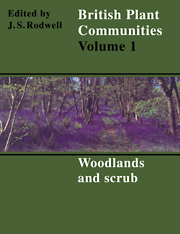Book contents
- Frontmatter
- Contents
- List of Figures
- Foreword
- Preface and Acknowledgements
- Preamble
- General Introduction
- Woodlands and Scrub
- Introduction to Woodlands and Scrub
- Key To Woodlands and Scrub
- Community Descriptions
- W1 Salix Cinerea-Galium Palustre woodland
- W2 Salix Cinerea-Betula Pubescens-Phragmites Australis Woodland
- W3 Salix Pentandra-Carex Rostrata Woodland
- W4 Betula Pubescens-Molinia Caerulea Woodland
- W5 Alnus Glutinosa-Carex Paniculata Woodland
- W6 Alnus Glutinosa-Urtica Jzozca Woodland
- W7 Ainus Glutinosa-Fraxinus Excelsior-Lysimachia Nemorum Woodland
- W8 Fraxinus Excelsior-Acer Campestre-Mercurialis Perennis Woodland
- W9 Fraxinus Excelsior-Sorbus Aucuparia-Mercurialis Perennis Woodland
- W10 Quereus Robur-Pteridium Aquilinum-Rubus Fruticosus Woodland
- W11 Quereus Petraea-Betula Pubescens-Oxalis Acetosella Woodland
- W12 Fagus Sylvatica-Mercurialis Perennis Woodland
- W13 Taxus Baccata Woodland
- W14 Fagus Sylvatica-Rubus Fruticosus Woodland
- W15 Fagus Sylvatica-Deschampsia Flexuosa Woodland
- W16 Quereus spp.-Betula spp.-Deschampsia Flexuosa Woodland
- W17 Quereus Petraea-Betula Pubescens-Dicranum Majus Woodland
- W18 Pinus Sylvestris-Hylocomium Splendens Woodland
- W19 Juniperus Communis Ssp. Communis-Oxalis Acetosella Woodland
- W20 Salix Lapponum-Luzula Sylvatica Scrub
- W21 Crataegus monogyna-Hedera helix scrub
- W22 Prunus Spinosa-Rubus Fruticosus Scrub
- W23 Ulex Europaeus-Rubus Fruticosus Scrub
- W24 Rubus Fruticosus-Holcus Lanatus Underscrub
- W25 Pteridium Aquilinum-Rubus Fruticosus Underscrub
- Index of Synonyms to Woodlands and Scrub
- Index of Species in Woodlands and Scrub
- Bibliography
Foreword
Published online by Cambridge University Press: 04 July 2020
- Frontmatter
- Contents
- List of Figures
- Foreword
- Preface and Acknowledgements
- Preamble
- General Introduction
- Woodlands and Scrub
- Introduction to Woodlands and Scrub
- Key To Woodlands and Scrub
- Community Descriptions
- W1 Salix Cinerea-Galium Palustre woodland
- W2 Salix Cinerea-Betula Pubescens-Phragmites Australis Woodland
- W3 Salix Pentandra-Carex Rostrata Woodland
- W4 Betula Pubescens-Molinia Caerulea Woodland
- W5 Alnus Glutinosa-Carex Paniculata Woodland
- W6 Alnus Glutinosa-Urtica Jzozca Woodland
- W7 Ainus Glutinosa-Fraxinus Excelsior-Lysimachia Nemorum Woodland
- W8 Fraxinus Excelsior-Acer Campestre-Mercurialis Perennis Woodland
- W9 Fraxinus Excelsior-Sorbus Aucuparia-Mercurialis Perennis Woodland
- W10 Quereus Robur-Pteridium Aquilinum-Rubus Fruticosus Woodland
- W11 Quereus Petraea-Betula Pubescens-Oxalis Acetosella Woodland
- W12 Fagus Sylvatica-Mercurialis Perennis Woodland
- W13 Taxus Baccata Woodland
- W14 Fagus Sylvatica-Rubus Fruticosus Woodland
- W15 Fagus Sylvatica-Deschampsia Flexuosa Woodland
- W16 Quereus spp.-Betula spp.-Deschampsia Flexuosa Woodland
- W17 Quereus Petraea-Betula Pubescens-Dicranum Majus Woodland
- W18 Pinus Sylvestris-Hylocomium Splendens Woodland
- W19 Juniperus Communis Ssp. Communis-Oxalis Acetosella Woodland
- W20 Salix Lapponum-Luzula Sylvatica Scrub
- W21 Crataegus monogyna-Hedera helix scrub
- W22 Prunus Spinosa-Rubus Fruticosus Scrub
- W23 Ulex Europaeus-Rubus Fruticosus Scrub
- W24 Rubus Fruticosus-Holcus Lanatus Underscrub
- W25 Pteridium Aquilinum-Rubus Fruticosus Underscrub
- Index of Synonyms to Woodlands and Scrub
- Index of Species in Woodlands and Scrub
- Bibliography
Summary
This work is a landmark in the historical journey of British botany. It will provide a source of reliable information about vegetation for research workers, conservation managers and dedicated amateurs for many years to come.
It is the culmination of fifteen years’ detailed survey and analysis of British vegetation. It began in 1975 with a contract from the Nature Conservancy Council to Lancaster University and involved leading ecologists in this and other universities contributing their particular skills in a coordinated team. During the course of the project, many other botanists and researchers have willingly supplied their data and ideas, which have enhanced the final work greatly.
The published work will be in five volumes - woodlands and scrub; mires and heaths; grasslands and montane vegetation; aquatic communities, swamps and tail-herb fens; maritime and weed communities.
The aim of the project is to describe British vegetation as a series of plant communities, to understand how these relate to one another and to set them in a wider European context. The scheme is systematic and analytical and it takes into account the influence of environmental factors and management practices, an understanding of which is vital for the conservation of vegetation.
We who are the inheritors of the good work of the Nature Conservancy Council will use the work also in measuring our own progress in conserving and studying the rich variety of British plant communities.
Professor Sir Frederick Holliday CBE DL FRSE
Chairman Designate
Joint Nature Conservation Committee
- Type
- Chapter
- Information
- British Plant Communities , pp. viiiPublisher: Cambridge University PressPrint publication year: 1991

